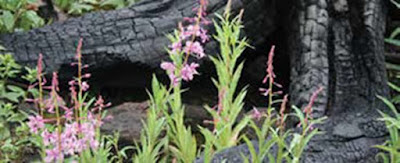Why do plant seeds in Australia start germinating after a fire? It is because of Karrikin Insensitive2 (KAI2) a protein which has been present in plants for millions of years. KAI2 has been important for all plants for 400 million years.
When the KAI2 protein was removed from a higher, more recent plant, Arabidopsis thaliana, its leaves malformed. Yet splicing the KAI2 back by taking it from the ancient Selaginella resulted in improved A. thaliana growth, but it could no longer detect the presence of smoke the normal function of KAI2.
This finding shows the more general function of KAI2. It not only identifies karrikins in smoke, it is important for plant growth. "Sensing" is the main purpose of KAI2. Apparently it can be tuned to detect different things. This could help farmers control seed germination times.
Wheat is notorious for germinating in the grain during heavy rain periods. Being able to spray a chemical that stops this would save millions of dollars and improve crop yields. Furthermore, spraying to stop weeds from sprouting would be the supreme herbicide.
◆ Biology by Ty Buchanan ◆
●







